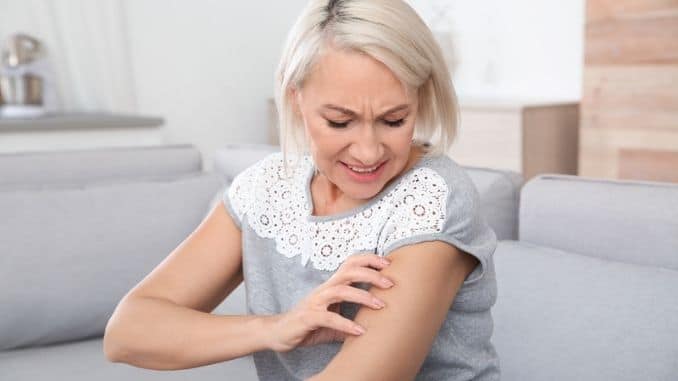It is very common and irritating to have a senior itch that is why there are 10 helpful tips to soothe senior itch. Emma scratched her leg again. What on earth was going on? She had applied moisturizer and applied moisturizer and still, it itched.
Was there something new she was allergic to?
She talked to her dermatologist and discovered that it wasn’t either of these things. Instead, she was experiencing something called “pruritus,” a common type of skin complaint in people 65 and older. Also called “senior itch,” it’s typically caused by changes that occur in the skin as we age.
Emma was glad to know exactly what she was dealing with. Her next question: How can I make it stop?

What is Senior Itch?
It’s common to have itchy skin now and then throughout life. But pruritis is unique in that it causes a chronic, uncomfortable, and irritating sensation that makes the person want to scratch frequently or even consistently. You can also try some tips to soothe senior itch.
The condition can show up with no visible symptoms at all, or it may be accompanied by redness and/or a rash. Scientists are still learning about it and trying to figure out exactly what causes it. What they do know is that it's common in seniors and that it can significantly affect their quality of life.
In a study of over 4,000 patients aged 65 years and over, researchers found that pruritis was responsible for 11.5 percent of hospital admissions and was the third most common cause of hospitalization. In another study of over 1,500 patients in nursing homes, pruritus was found in about two-thirds of the patients.
Researchers found in the third study that pruritis was evident in one-third of elderly people in nursing homes and over 40 percent of elderly African-Americans in the general population.
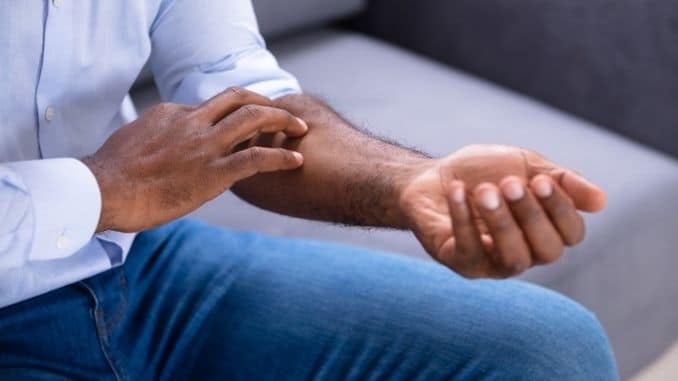
What Are the Symptoms of Senior Itch?
In most cases, senior itch causes symptoms like the following:
- Skin that provokes the urge to scratch
- Skin that is dry and/or flaky
- Itching that leads to scratching that can sometimes lead to infection
- A generalized itch over a large area with no visible skin changes
- An itch that's triggered by the slightest touch, such as an itch that begins when you put on a piece of clothing
- Itching that interferes with daily life—potentially causing insomnia and even depression
Though senior itch can affect any area of the body, it is most common in certain areas:
- Legs
- Back
- Scalp
- Arms
It’s also common for the condition to strike more often at night than during the day.

What Causes Senior Itch?
Itchy skin can be caused by several different factors, and often may be attributed to more than one. Some of the most common causes include:
- Dry skin: skin tends to get drier as we age, and dry skin can easily become irritated and itchy
- Contact dermatitis: skin that easily reacts to allergens
- Urticaria: itch induced by tight clothing and rashes
- Illnesses: several diseases that often affect seniors can cause itchy skin, including thyroid disorders, chronic kidney disease, iron deficiency anemia, and Hodgkin’s lymphoma
- Medications: some medications can lead to skin itch
- Neurological disorders: these are nerve disorders that can cause itchy skin
Though seniors may suffer from itching caused by one of the factors above, they may also be experiencing senior pruritis, which is chronic skin itching without any known cause.
“Identifying the underlying cause of chronic pruritus tends to be more difficult in older patients,” scientists wrote in a 2020 study. They went on to say that doctors need to look at all potential causes, such as those listed above, to determine an accurate diagnosis.

How the Skin Changes as We Age
Just as we work to keep our hearts and minds healthy as we age, so should we be mindful of the health of our skin. Without proper care, it tends to deteriorate over the years, which can lead to chronic itching.
The main change that occurs is the skin gets dryer. The outer barrier suffers from wear and tear and becomes less capable of hanging onto moisture. As the skin dries out, the barrier undergoes more deterioration. Where it used to be able to protect you from irritants and assaults from the environment, now it struggles to do that, allowing some of those irritants in, which further damages the outer barrier.
Scientists have also found that our sweat glands slow down as we age. These are the glands that produce the natural oil that moisturizes our skin. So this contributes to dryness and barrier breakdown as well. We lose more water from the skin throughout the day, and if we don’t replace it, skin dryness and irritation increase.
On top of that, it seems the level of fats in the skin decreases as we age too. Natural fatty acids, ceramides, and cholesterol plump up the skin and maintain its structure and hydration. Older patients have been found to have less of these natural fats in their skin, which further contributes to dryness.
There’s one more thing: pH changes in the skin—which are common in seniors—are known to lead to the activation of receptors that induce itch. So it's very possible that all of these changes could lead to chronic itch. The itch could be made worse by allergens, irritants, medications, and other factors common in seniors.
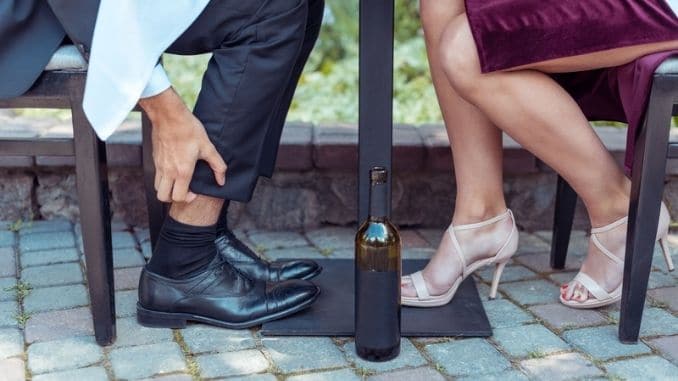
10 Tips to Soothe Senior Itch
If you're struggling with the senior itch, talk to your doctor or dermatologist about what may be causing it or you can try some tips to soothe senior itch. And if you can discover a disease, medication, or another issue that may be the source of the itching, you can address that issue and potentially address the itch at the same time.
If there is no clear cause, however, your next step is to try to heal your skin. There is currently no specific recommendation for the treatment of senior itch, so it’s best to focus on trying to reduce the damage while moisturizing and strengthening the outer barrier.
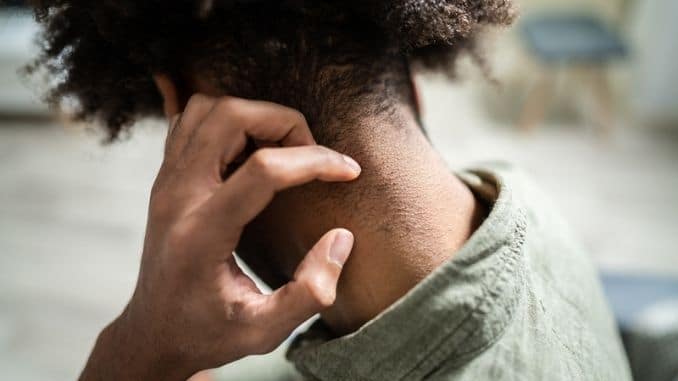
1. Choose a gentle cleanser.
If you’re using bar soap to cleanse your skin, it’s time to make a change. Clear liquid soaps should also be tossed out. These strip the oils from the skin and leave it feeling tight and dry.
Instead, look for a creamy cleanser with moisturizers in it that will gently cleanse the skin without leading to additional dryness.
2. Use a moisturizing toner.
After you cleanse your skin, if you normally use toner, check to see what's in it. If it contains alcohol, toss it and get a new one. Alcohol-based toners are drying. Choose a hydrating toner instead that contains natural oils or glycerin and will help prepare the skin for a moisturizer.
3. Buy a better moisturizer.
Many store-bought moisturizers contain mineral oil, petrolatum, synthetic fragrances, and other ingredients that are not deeply hydrating and can trigger allergic dermatitis. These moisturizers aren’t doing enough to protect your skin from the senior itch.
Choose instead more quality moisturizers that contain shea butter and other butter, ceramides, natural oils, vitamins and minerals, and other nourishing ingredients that are good for your skin.
This is the most important tool in your fight against senior itch, so take your time to find a good moisturizer both for your face and body. If you're suffering from scalp itch, there are scalp moisturizers on the market now too that may help.
Once you find a good moisturizer, use it a couple of times a day to help your skin stay hydrated.
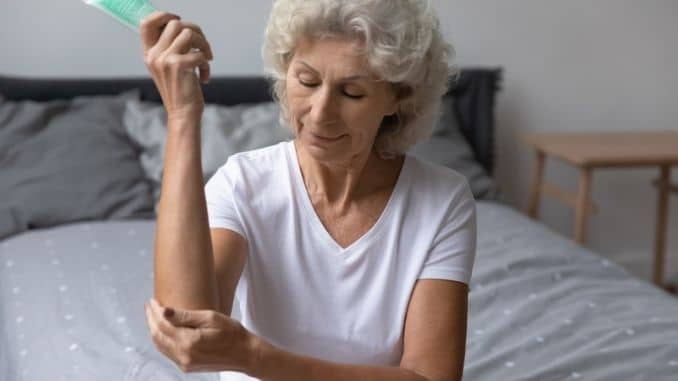
4. Take a lukewarm Epsom salt bath.
Hot water will make your itching worse, so try to take more lukewarm baths and showers. Adding Epsom salts, baking soda, or an oatmeal-based bath product to the water can help reduce skin itching.
5. Use more natural products.
Fragrance and other chemicals in your skincare, hygiene, and laundry products can be irritating to sensitive skin. Look for products with fewer harsh chemicals and more natural ingredients, and choose fragrance-free in general.
6. Ask your doctor about antihistamines and other medications.
In some cases, antihistamines can help soothe the senior itch. It depends on the person, though. In some studies, they help but in others, they make no difference. It’s worth a try, however, to see if they may help you.
Some research has found that gabapentin, an anti-epileptic drug; cyclosporine, an immunosuppressive drug, and antidepressants like Prozac and Zoloft may also be effective against senior itch in some people. You and your doctor can discuss the risks and benefits.
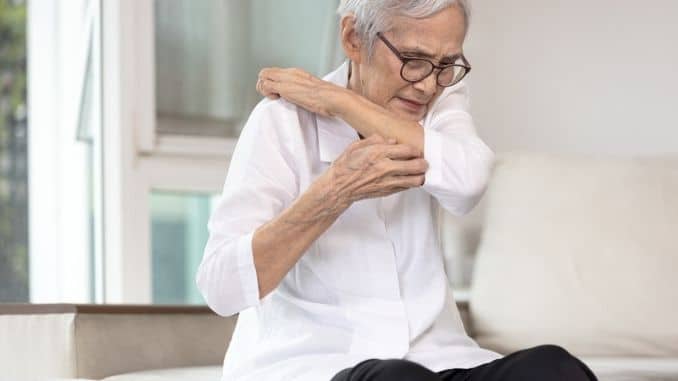
7. Consider medicated creams and ointments.
If your skin is itchy and red, your doctor may recommend medicated creams or ointments. These may contain corticosteroids, which can soothe the itch and cool the irritated area. They can also help trap moisture in the skin so it doesn’t dry out so easily.
There are other medicated creams as well, including those with triamcinolone (another steroid), tacrolimus (immunosuppressive), and pimecrolimus (immunosuppressive). Keep in mind that long-term use of steroid creams may not be a good idea, as they may cause side effects over time.
Some over-the-counter creams that may help include those with calamine, menthol, camphor, and capsaicin in them. Storing these in the refrigerator can enhance their soothing effects.
8. Try ultraviolet therapy.
Sometimes shining the light on your skin can help it heal. Rather than go out into the sun, talk to your dermatologist about Ultraviolet B (UVB) phototherapy, which directs UVB rays to the affected area of the skin. It has few side effects and may provide relief. It does require multiple or ongoing treatments. There are at-home phototherapy lamps you may be able to try.
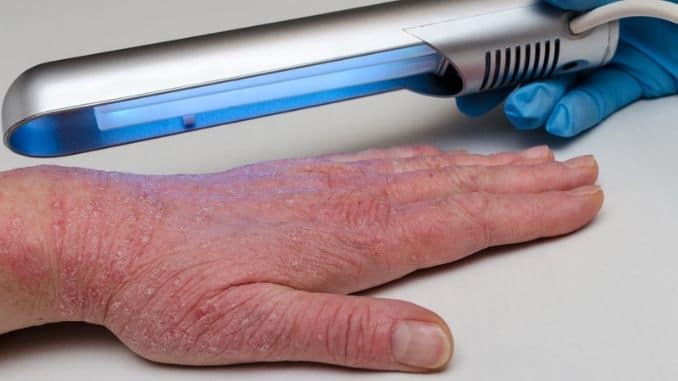
9. Look into TENS.
Transcutaneous electrical nerve stimulation (TENS) may be effective in treating particularly stubborn cases of senior itch. It is a method of pain relief involving the use of a mild electrical current.
For this treatment, you purchase a small TENS machine and attach the sticky pads (electrodes) directly to the affected area of the skin. When you turn the machine on, small electrical pulses are delivered to that area, which creates a tingling sensation.
These impulses can reduce the pain signals going to the brain, and may help relieve skin itch and irritation.
10. Use a humidifier.
If you live in a dry climate, the air is constantly robbing your skin of moisture. You can slow this thievery down by getting a humidifier. It puts moisture back into the air, helping to keep your skin more hydrated. These are particularly effective when used in your room overnight.
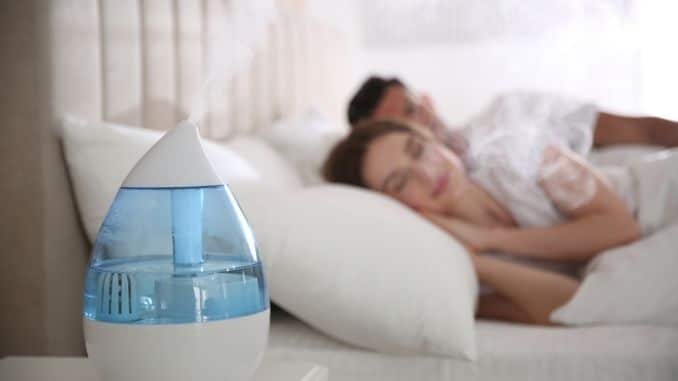
Although senior itch can be incredibly annoying, in most cases it is not dangerous. There may be a risk of infection if your incessant scratching breaks the skin, so do your best to alleviate the itchiness using the tips and suggestions listed above. Talk to your doctor or a dermatologist if your symptoms persist. You can also try these tips to soothe senior itch.
Learn the best-kept secret for looking and feeling years younger. Click here to discover how.

